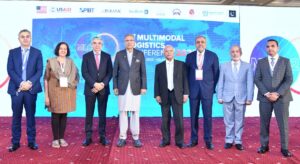Pakistan’s first Multimodal Logistics Conference concludes:
Islamabad: By making economic dividends accessible to large segment of nation, a vibrant presence of logistics sector may play a pivotal role in inclusive national growth, said by President of Pakistan Dr. Arif Alvi while inaugurating Pakistan’s first Multimodal Logistics Conference here at a local hotel today (Thursday).
Aiming to initiate a public policy debate on Logistics & freight system, the one-day Conference “Trade Growth of Pakistan through Multimodal Logistics” was organized by Manzil Pakistan, a Karachi based think tank in collaboration with All Pakistan Shipping Association (APSA) while U.S. Agency for International Development (USAID), Pakistan International Bulk Terminal (PIBT), JS Bank and Faysal Bank Ltd contributed as partner in conference. The conference featured various interactive sessions and insightful contributions of industry leaders & experts on a diverse range of topics focusing different sectors of national logistics and freight network.
President of Pakistan Dr. Arif Alvi inaugurated the conference and lauded the organizers for taking this initiative to highlight the importance of logistics sector in national trade and economic growth. A modern and technology based logistics and freight system is one of the basic ingredients to achieve desired economic growth by leveraging accessibility, President said. Pakistan’s regional connectivity is poised with tremendous potential due to its geo-strategic location, he added.
While addressing the inaugural session, Mr. Asim A. Siddiqui, Vice Chairman of Manzil Pakistan expressed his gratitude to the President. Asim Siddiqui shared the theme and concept of the conference with the audience. He highlighted that Pakistan eagerly needs a thematic change and complete remodeling to integrate the multimodal logistics scenario in its stepping forward economy. He further emphasized that despite having a National Freight and Logistics Policy (NFLP) in place, the sector is still fragmented and policies in relation to its integration requires considerable deliberation by public authorities, therefore, Manzil Pakistan has taken the lead to organize this conference to bring all stakeholders both from the private sector and public authorities to initiate a public policy debate to benefit the country.
The conference featured panel discussions and specialized sessions, on different sectors of the trade transport industry. A panel discussion “Public-Private Sector Institutional Harmony for Integrated Multimodal logistics in Pakistan” was chaired by Dr. Ishrat Hussain Former Advisor to the Prime Minister on institutional Reforms & Austerity and Ex-Governor State Bank of Pakistan. This is followed by an exclusive session “Optimizing Blue Economy: Issues and Challenges” presented an overview of Pakistan’s Maritime and shipping industry. To discuss the importance of Highways in logistics industry, participants shared their viewpoints in a session “Connecting Highways with Smart Hinterland Transport Network”. A special session chaired by Secretary Railways on Railway Freight services and their valuable part in national logistics network was discussed in a specified session “Business Enabling Environment: Empowering Private Sector in Rail-Freight Business”.
Keeping in view the importance of China Pakistan Economic Corridor (CPEC) and regional connectivity for the future of domestic commerce and foreign investments in Pakistan was discussed in an exclusive session “CPEC, Regional Connectivity for Trade & Domestic Commerce”.
The conference was concluded by Ameena Saiyid OBE, Member, Board of Trustees, Manzil Pakistan and Mr. Asim A. Siddiqui along with other dignitaries. The conference was attended by senior government officials, representatives of renowned logistics organizations along with stakeholders and members of business community. Representatives of the institutions will be shared their opinions on different aspects of Pakistan’s national logistics and freight system along with the institutional role in different relevant sectors.

